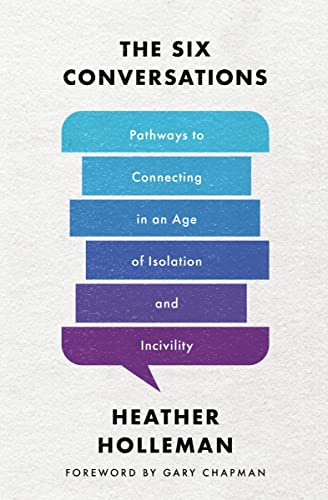

Continuing Conversations Matter, reflecting on THE SIX CONVERSATIONS: Pathways to
Connecting in an Age of Isolation and Incivility by Heather Holleman.
In Simple Terms, If I Were To Tell You The Four Most Critical Things To Do To Foster A Warm And Connected Conversation, I’d Say This:
* Be Curious
* Believe The Best
* Express Concern
* Share Your Life
Without positive regard (believing the best), our attempts at curiosity won’t make much difference. I’ve known people who act curious about my life for self-serving reasons; they want morsels to gossip about or ways to trap me in opinions they want to disparage. Or they just run through a list of questions because they are trying to connect out of duty or because it feels like a good leadership skill to ask a good question. Worse, I know they don’t necessarily like me or wish to warmly connect; they want to talk for argument’s sake. But when someone asks questions rooted in genuine interest from a position of love and respect, I love to open up to this person.
The Six Conversations
In simple terms, positive regard means you position yourself to respect, admire, like, and enjoy the person with whom you’re in conversation.
At this point, I am of the opinion that Believing the Best may be the most challenging of the four most critical things to do to foster a warm and connected conversation. Let me explain:
Some years ago I came across this quote from A.W. Tozer: “What comes into our minds when we think about God is the most important thing about us.”. I believe that is an essential truth. If what comes into our minds about God is incorrect, our relationship with God and its demonstration in our lives will not be experienced to its fullest, if at all. The intricacies and implications of knowing God are beyond this post, but it sets up my point about believing the best.
Back to “Believing the Best”.
Repurposing Tozer’s quote
” What comes into our minds when we think about the other person is the most important thing when it comes to warm and connected conversations”.
Without positive regard for the other person, conversation will not achieve its full potential, or, perhaps, any benefit at all, or, worse, be damaging.
…imagine what it feels like to enter into a conversation with someone who you feel judges you, who criticizes you, and who is looking for ways to put you down, improve you, or change you. Nobody wants to open up in an environment like this.
Trust is a prerequisite to believe the best about someone. Unfortunately, trust is becoming more and more scarce in our polarized and divisive society.
…in the early 1970s half of Americans said that most people can be trusted; today that figure is less than one-third. And a recent Pew poll found that social trust declines sharply from generation to generation. In 2018, around 29% of Americans over 65 said that most people can’t be trusted, while 60% of Americans 18 to 29 agree. Recent research suggests that social trust levels harden with age, meaning that trust will continue to fall as trusting generations are replaced by mistrustful ones.
I am confident “Believe the Best” is necessary and appropriate in fostering meaningful and healthy conversations. I am not confident “the best” is what comes into our minds of most of us when we think about others.
“Give the benefit of the doubt” or similar sentiments are not a part of today’s lexicon. As seen in the data above there is not much reason for optimism that attitudes toward each other will improve.
I would argue that “believe the best” is an attribute of Christ followers. Ironically, it seems many who profess to be Christians choose to not to give the benefit of the doubt nor believe the best; which may explain why warm and connected conversations are an anomaly for many Christians.
Hopefully, observations in this post will stimulate self-examination as it has for me.
Consider:
Reflecting on what first comes into your mind about the other people.
Ask if your first impulse is to believe he best? Give the benefit of the doubt?
If not, why is that so and how can it be changed?
Heather Holleman offers this advice:
When I’m having trouble choosing to believe the best about someone because of their actions or attitudes that I may find morally reprehensible, I try to think of what this person was like as a child. I remember to discover the story behind why this person feels or acts as they do. Then I find myself overcome with compassion rather than condemnation.
The SixConversations pg.30
STILL ON THE JOURNEY